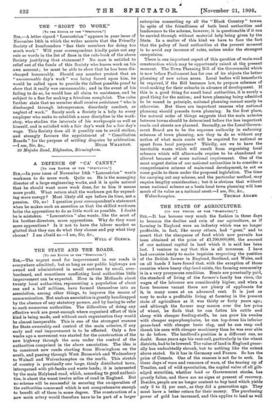THE STATE AND THE ROADS.
fTo THE EDITOR OF THE "SPECTATOE."] Si,—The urgent need for improvement in our roads is everywhere admitted; but so long as our public highways are owned and administered in small sections by small, over- burdened, and sometimes conflicting local authorities little improvement can be expected. Here in the Midlands about twenty local authorities, representing a population of about one and a half millions, have formed themselves into an association, among other things, to improve the means of communication. But Buchan association is greatly handicapped by the absence of any statutory powers, and by having to refer to such numerous authorities. The difficulties of doing any effective work are great enough where organised effort of this kind is being made, and without such organisation they would be almost insuperable. This is one of the strongest reasons for State ownership and control of the main arteries, if any early and real improvement is to be effected. Only a few weeks ago a movement was started for the construction of the new highway through the area under the control of the authorities comprised in the above association. The idea is to construct new roads starting from Birmingham on the south, and passing through West Bromwich and Wednesbury to Walsall and Wolverhampton on the north. This stretch of country is practically one large, thinly distributed town, interspersed with pit-banks and waste lands; it is intersected by the main Holyhead road, which, according to good authori- ties, is about the worst twelve miles of road in England. But no scheme will be successful in securing the co-operation of the authorities concerned which is not comprehensive enough to benefit all of them in some degree. The construction of a new main artery would therefore have to be part of a larger enterprise connecting up all the "Black Country" towns: In spite of the friendliness of both local authorities and landowners to the scheme, however, it is questionable if it can be carried through without material help being given by the State. In a matter of this kind we have to face the fact that the policy of local authorities at the present• moment is to avoid any increase of rates, unless under the .strongest compulsion:
There is one impertant aspect of this question of main-road construction which may be opportunely raised at the present moment. The Town Planning Bill of the Government which is now before Parliament has for one of its objects the better planning of new urban areas. Local bodies will henceforth be required, if the Bill becomes law, to prepare schemes of road-making for their suburbs in advance of development. If this is a good thing for small local authorities, it is surely a good thing for the nation; and town planning being admitted to be sound in principle, national planning cannot surely be otherwise. But there are important reasons why national planning should precede town planning. In the first place, the natural order of things suggests that the main arteries between towns should be determined before the less important roads and streets are planned. Secondly, as the Local Govern- ment Board are to be the supreme authority in enforcing schemes of town planning, are they to do so without any notion of what main roads will be required for national as apart from local purposes ? Thirdly, are we to have the inevitable waste which will result from organising local schemes which will afterwards require to be abandoned or alteVed because of some national requirement. One of the most urgent duties of our national authorities is to consider comprehensive scheme of main-road development, to act as some guide to them under the proposed legislation. The time for carrying out any scheme, and the particular method, may require lengthy consideration ; but it is obvious that without some national scheme as a basis local town planning will lose much of its value as a national asset.—I am, Sir, &c.,
































































 Previous page
Previous page